Coast Guard Fires Live Ammo in Great
Lakes Exercises
by Thom Burns
The U.S. Coast Guard wants to establish 34 "permanent safety zones" on the five Great Lakes so its crews can practice firing "machine guns, rifles and 9mm guns, according to numerous press accounts. The Guard says its crews need to train for combating terrorists and intercepting smugglers.
The proposed zones have upset ferry boat owners, fishing enthusiasts, sailors
and environmentalists -- most of whom missed the Guard's Aug. 1 call for public
comment, published in the Federal Register.
Congressional concerns from Michigan, Wisconsin, Minnesota and Ohio forced the Guard to extend the comment period to November 13th.
The zones include areas near shore lines and where public ferries cross the
waters. Initially Cmdr. Gustav Wulfkuhle of the Guard's 9th District told the
Detroit Free Press there were no plans to extend the comment period or hold
public hearings.
The Guard promises that boaters and shipping companies will be warned away from
the zones when live-fire exercises are being conducted, according to a release.
But Bob Bokram, harbormaster at one Detroit-area marina, told the Detroit Free
Press he's worried about some people not getting the word. He said most boats
that use his marina are small and don't have or use marine radios. "Most people
communicate by cell phone," he said.
| Proposed Fire Zones | |
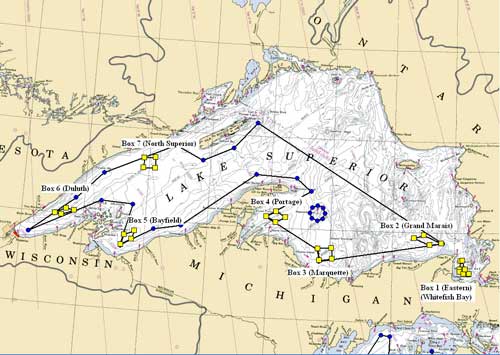 |
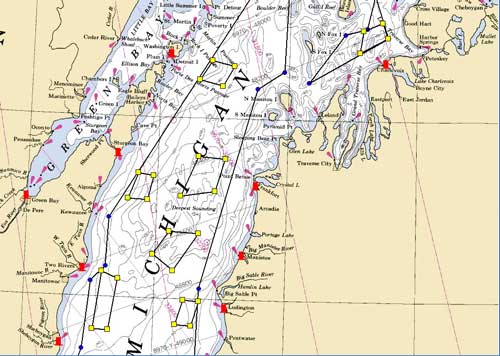 |
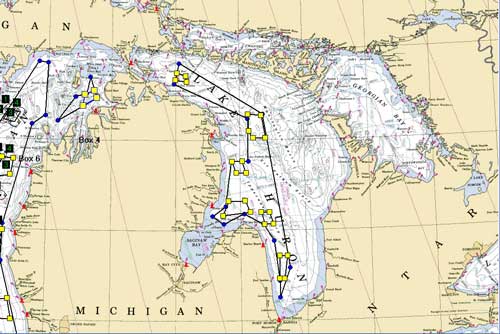 |
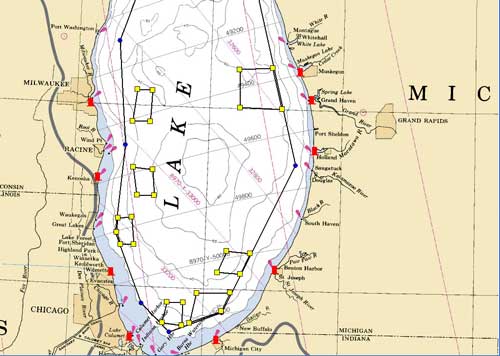 |
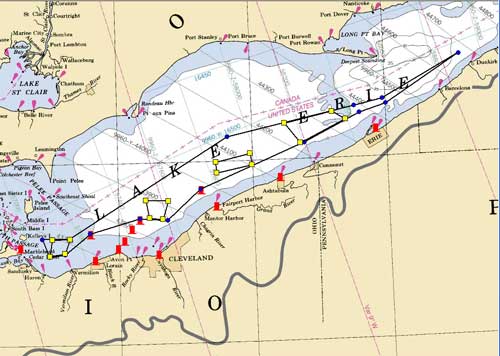 |
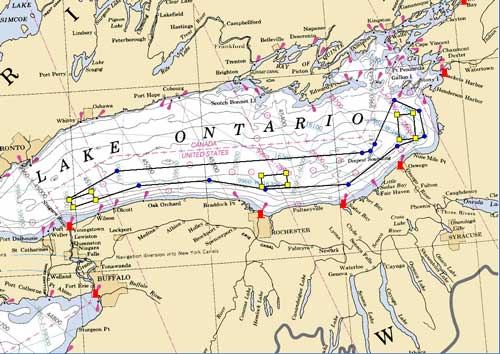 |
According to the Guard's notice in the Federal Register, there would be 14
safe firing zones on Lake Michigan, seven on Lake Superior, six on Lake
Huron, four on Lake Erie and three on Lake Ontario.
Two U.S. Coast Guard boats fired machine guns at a floating target on Lake
Superior, eight miles off Two Harbors, MN, drawing criticism from the mayor
of Duluth.
Coast Guard crews fired the M-240 machine guns about eight miles offshore from
Two Harbors, said Chief Petty Office Robert Lanier, spokesman for the Coast
Guard's Great Lakes district, based in Cleveland.
Duluth Mayor Herb Bergson said he had been led to believe there would be no live
fire exercises during the Coast Guard's extended public comment period on the
issue, which runs through Nov. 13.
Lanier said the target practice was announced on marine band radio Channel 16
more than two hours before firing began and every 10 minutes during the
exercise.
At least two pleasure craft witnessed the firing.
"I'm outraged ... I would think the public is outraged,'' Bergson said at a
hastily called news conference Tuesday afternoon.
Lanier said Tuesday that creation of the permanent zones was put on hold, but
live-fire training was not, and that there are no plans to suspend exercises
during the public discussion on creating the training zones.
"We need to do the necessary training to conduct our missions of maritime
safety, homeland security and national defense. ... We never intended to say
that we were putting training on hold,'' Lanier said.
The Coast Guard has held 24 live-fire exercises across the Great Lakes this year
and at least two more are scheduled, though not on Lake Superior, he said.
Bergson criticized the live-fire training because of the lead bullets that fall
into Lake Superior. At a time when the federal government is pushing efforts to
clean up the Great Lakes and with state officials encouraging anglers to use
lead-free fishing tackle, he said, the same government is putting toxic lead on
the lake bottom.
Bergson said the live-fire issue came up during a teleconference last week among
several Great Lakes mayors, members of the Great Lakes and St. Lawrence Cities
Initiative.
"Everyone was concerned about it,'' he said.
The mayor said he opposes all live-fire training on the Great Lakes. He said the
shooting should be done on land at police ranges where lead is controlled.
Lanier said an internal Coast Guard environmental review found no major impact.
The machine guns on the cutters can fire 600 rounds per minute. The Coast Guard
hired consultants and concluded that no damage would occur to the environment.
The Michigan Environmental Council isn't so sure. If the data aren't available
to the public, there is no way to determine whether that claim is accurate, the
council said in comments to the Guard. Federal law prohibits hunters from using
lead shot because it's toxic to waterfowl, the council said.
Cmdr. Gustav Wulfkuhle of the 9th District's enforcement division said the
ammunition that will be used in the live-fire exercises is lead inside a copper
jacket, about the size of a 1/3 -ounce lead fishing weight.
"Where we will be shooting, 5 miles offshore, the water is deep," he said. "We
won't be shooting in marshes, so waterfowl can't pick it up."
Wulfkuhle said few fish feed on the bottom.
Many Canadians were insulted when the Bush Administration decided to arm the
U.S. Coast Guard boats on the Great Lakes with the 600 round per minute machine
guns. In the wake of the War of 1812, the U.S. and Canada agreed in a treaty to
outlaw gunboats on the Great Lakes. In the aftermath of September 11, the two
governments agreed to amend the treaty. Mike Bradley, mayor of Sarnia, Ontario
told the Free Press of London, Ontario that he was stunned to learn that one of
the sites chosen for practice firing lies about twelve miles north of Sarnia
which is across the St. Clair River from Port Huron, Michigan.
The Sarnia mayor seemed unconvinced that any military firing close to
Canadian waters can be justified. “We treasure the Great Lakes as a safe
zone, not as a free-fire zone,” Bradley told the London Free Press. “This is
simply unacceptable. You can see the potential for tragedy. I find it
incomprehensible this would even be considered.”
Publisher’s Note
I am a retired navy surface warfare officer with a fairly extensive
background in training and firing similar weapons off of small navy ships.
The U.S. Coast Guard would be much better off establishing one firing range
for the entire Great Lakes where they would send their crews to be trained
under some very stringent guidelines enforced by senior personnel using
special environmentally friendly ammunition.
Most of the Coast Guard personnel are quite young, eighteen to twenty-two years
old, aboard these small boats. The weaponry described in this article is very
dangerous. These exercises are probably an accident waiting to happen. The
mayors of Sarnia, Ontario and Duluth, Minnesota and dozens of other cities have
every right to be concerned as do you, the average recreational sailor.
And, what about the environmental impact of dumping lead into our mostly
pristine lakes? We as a nation should have better sense by now than to take
these kinds of risks which future generations will pay for. Please add your
voice against this crazy plan. Here’s how:
Commander, Ninth Coast Guard District, 1240 E. Ninth Street, Room 2069,
Cleveland, OH 44199
Copy to Congressman
All contents are
copyright (c) 2006 by Northern Breezes, Inc. All information contained
within is deemed reliable but carries no guarantees. Reproduction of any
part or whole of this publication in any form by mechanical or electronic
means, including information retrieval is prohibited except by consent of
the publisher.